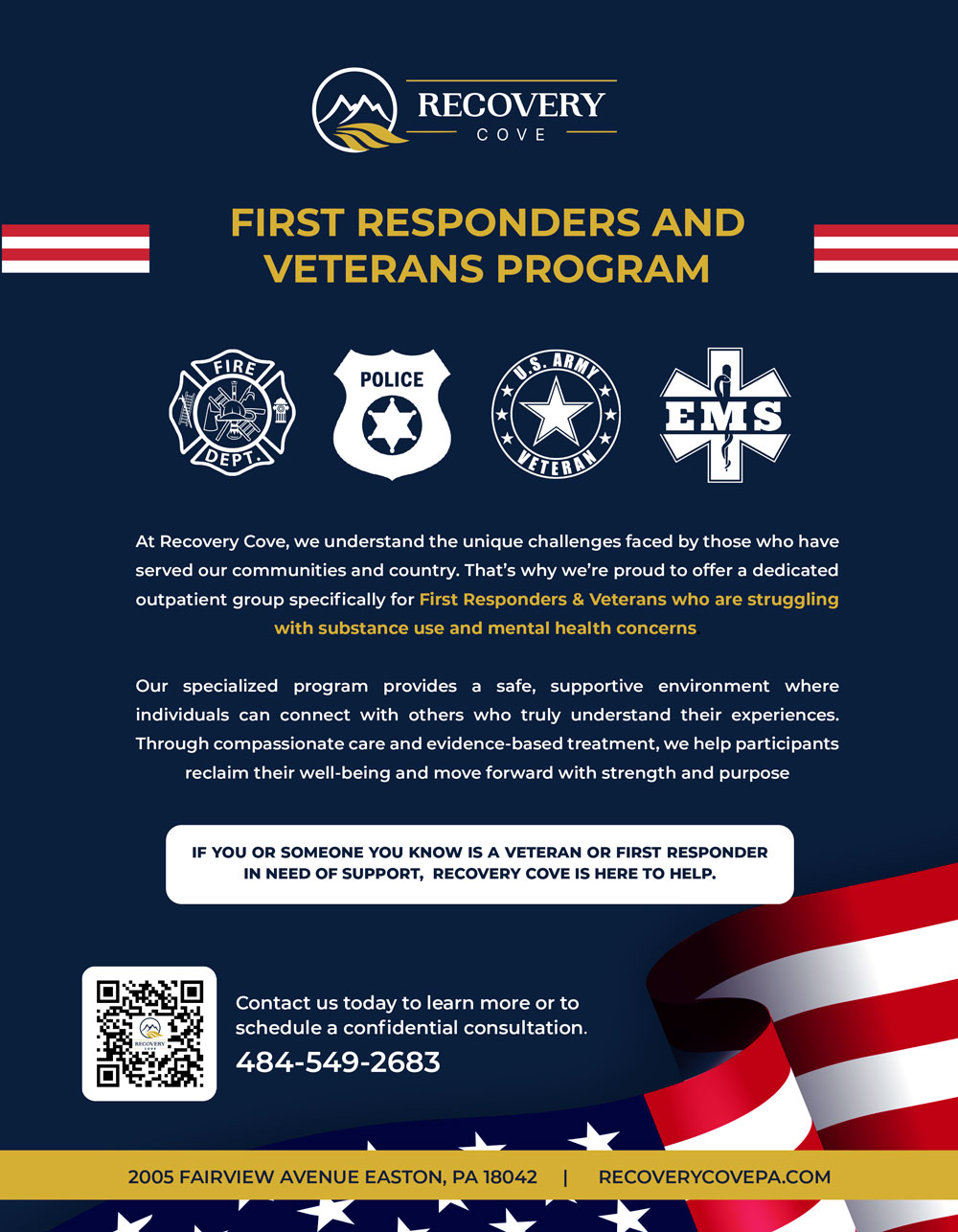
Opioids are medications prescribed by doctors to treat pain. Often referred to as narcotics, these drugs work by attaching to opioid receptors on cells located in the brain, spinal cord and other organs. This blocks the perception of pain. While opioids can relieve pain quickly and effectively, they do carry risks and can be highly addictive. The longer opioids are used, the greater the risk for addiction.
Opioid abuse is a major problem in the U.S. Since 1999, more than one million people have died from an overdose, and the majority of them involve opioids. For instance, in 2021, opioids accounted for 75 percent of overdose deaths. Of these, nearly 88 percent involved synthetic opioids like fentanyl and carfentanil.
If you are struggling with an addiction to opioids, our opiate addiction treatment center in Easton can help. Recovery Cove provides personalized treatment services in a caring, compassionate environment. Reach out to us today at 484-549-COVE to learn more.
Opioids and Opiates: What are these Drugs?
First, let’s explain the difference between opioids and opiates. While these two terms are often used interchangeably, they are actually slightly different. Opioids refer to natural, semi-synthetic and synthetic opioids. Opiates, on the other hand, refer to natural opioids that come from plant matter, such as heroin and morphine.
Both opioids and opiates are used medically and prescribed for things like pain relief, cough suppression, anesthesia and even the treatment of opioid use disorder (OUD). They can also be used illicitly by people who are trying to get high.
The most common opioids include:
⦁ Oxycodone
⦁ Hydrocodone
⦁ Fentanyl
⦁ Morphine
⦁ Codeine
⦁ Heroin
⦁ Methadone
⦁ Tramadol
⦁ Buprenorphine
How Addictive are Opioids?
Opioids are among the most addictive drugs. Due to this risk, medical professionals must follow safe opioid prescribing, which involves using the lowest dose possible, considering alternative ways to manage pain, explaining all risks to patients and monitoring patients closely. Even then, people can still develop a dependency on the drug.
What makes opioids so addictive is that they activate powerful reward centers in the brain. When opioids bind to and activate these receptors, endorphins are released – far more than you can get with natural activities. This creates an intense rush of pleasure, which is why the brain wants you to repeat it.
The Cycle of Opioid Addiction
It doesn’t take much time for tolerance to build. Once you start taking opioids regularly, you need more and more to achieve the same pleasurable effects. This happens because your body is building tolerance. It’s in this part of the cycle where some people start dabbling in other substances to achieve a greater high, such as by combining painkillers with alcohol.
Once you are dependent on opioids, a full-blown addiction can occur. Now you need opioids to feel normal – not just good. If you don’t have these drugs on hand, you can suffer uncomfortable withdrawal effects. It’s at this point that some people turn to other substances to fill their cravings, such as heroin.
Because heroin is an opioid, it produces similar effects. It’s also cheaper and easier to get than prescription medications. Sadly, nearly 80 percent of heroin users reported using prescription opioids prior to heroin. This shows how addictive prescription opioids can be, and what can unfold without professional intervention.

Treatment Options for Opioid Addiction
Opioid addiction is a significant public health concern. Fortunately, there are various treatment options available, including medication-assisted treatment (MAT) and counseling. Outpatient rehab centers are often the first choice, as they provide personalized treatment solutions in a nurturing environment with peer support. You can also maintain your responsibilities at home and remain close to your support network.
Let’s explore the best treatments offered at our opiate addiction treatment center in Easton.
⦁ Detox. Detoxification refers to gradually reducing the dose of an opioid under medical supervision. While we do not offer medical detox on-site, we do have medications to help you through this process, and we can refer you to a local detox center.
⦁ Medication-assisted treatment (MAT). ⦁ MAT uses medications like buprenorphine, methadone or naltrexone to reduce cravings, lessen the intensity of withdrawal symptoms and block the pleasurable effects of opioids. These medications are safe and approved by the FDA.
⦁ Counseling and behavior therapy. Behavioral therapies like cognitive behavioral therapy (CBT) can help you understand your inner struggles and how they may be contributing to your substance use. Therapy also helps in developing effective coping strategies.
⦁ Support groups. Support groups like AA offer a sense of community and belonging. You can learn a lot from others by opening up and sharing your story.
⦁ Holistic approaches. Since addiction is a disease of the mind, body and spirit, we also believe in the power of a holistic recovery. Rather than just relying on medication and therapy, we also teach our clients to find relief through holistic practices like yoga, meditation, music and art.
⦁ Family support. Your family’s support is invaluable during this time. But it’s important that your family knows how to support you in a healthy way, as enabling is often confused for helping, creating a toxic cycle.
⦁ Aftercare. When you leave rehab for an opioid use disorder, your work does not end here. In fact, it’s just the beginning! Your aftercare plan can provide ongoing support that protects you from relapse.
Start Your Recovery at Our Opiate Addiction Treatment Center in Easton
It’s tough to beat an opioid addiction, as opioids are powerful drugs that create intense highs. The body is made to crave things that make it feel good, and this is the case with substances like opioids. However, recovery is possible. Opioid use disorders are treatable, and many people go on to lead fulfilling lives after treatment.
With a combination of medication and counseling, you can get your life back on track. Contact Recovery Cove at 484-549-COVE to learn more about our outpatient treatment services. We will help you identify the issues that may be contributing to your opioid use, along with healthier ways to cope. A better life awaits, and we can help you build that life starting today!









